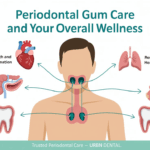Wisdom tooth removal is a common oral surgery procedure, but what do you need to know if your tooth needs to be removed ASAP? In this article, we’ll discuss some important information that you should be aware of when it comes to emergency wisdom tooth removal.
What are Wisdom Teeth?
Wisdom teeth are the third and final set of molars that appear in the back of the mouth, usually between the ages of 17 and 25. They come at a time when we’re young adults and often referred to as our adult teeth. Having wisdom teeth can be both an exciting and a dreaded event. On the one hand, they come in as a sign of growth and growing up. On the other hand, they can cause crowding problems in the mouth, leading to tooth pain and infection.
It is important to have wisdom teeth monitored regularly to detect any potential problems in the early stages. If your wisdom teeth are not growing in properly or are causing any other type of pain or discomfort, your dentist can recommend wisdom tooth extraction. In some cases, surgery to extract wisdom teeth may be necessary. This is called “exodontia” and is generally done under local or general anesthesia. The procedure is usually straight forward and entails the removal of any impacted teeth and the surrounding gum tissue.
Although having wisdom teeth can be difficult, making the right decisions when it comes to monitoring and extraction can help prevent future problems. Remember, if you ever experience pain, discomfort, or swelling around the area of your wisdom teeth, contact your dentist to determine if you have tooth decay wisdom teeth.
What are Impacted Wisdom Teeth?
Not all wisdom teeth grow in correctly, as they sometimes become impacted, or stuck, in the jaw. This means that a tooth may not have enough room to grow into the mouth properly, leading to crowding and pain. Impacted wisdom teeth can also cause inflammation, jaw stiffness, and difficulty opening the mouth. In worst cases, impacted wisdom teeth can cause damage to adjacent teeth. This means that nearby teeth may be damaged or pushed out of their position in the jaw. Some other complications include gum disease and infection, as the overcrowding created by the impacted tooth can trap bacteria that can lead to an infection.
If your wisdom teeth are impacted, your dentist may recommend that they are removed. During the procedure, your dentist will gently break up the bone and tissue covering the tooth and then remove it using an elevator or forceps. Depending on the severity of each case, the procedure may take a few minutes up to an hour. Impacted wisdom teeth can be a hassle and the pain can be difficult to bear. If you have any concerns about your wisdom teeth, it is important to speak with your dentist as soon as possible to discuss your wisdom tooth extractions possibility.
Signs & Symptoms of Impacted Wisdom Teeth:
- Pain and swelling around the wisdom teeth
- Bad breath
- Reddened gums
- Jaw pain or stiffness
- Difficulty opening or closing the mouth
- Headaches
- Infections
- Tender lymph nodes
- Ulcers in the mouth
- Difficulties biting or chewing
If left untreated, impacted wisdom teeth can lead to more serious health issues. These can include:
- Cysts – Cysts are fluid-filled sacs that form around the teeth, causing damage to nearby teeth, roots, and jawbones.
- Periodontal disease – Periodontal disease is a bacterial infection that destroys the gums and supporting structures of the teeth.
- Sinus problems – Impacted teeth can affect your sinuses and result in sinus infections.
If you are experiencing the above signs and symptoms, contact your dentist as soon as possible. Your dentist will be able to examine your mouth and get to the bottom of the problem. Depending on the severity of the problem, your dentist may suggest medications to reduce pain, swelling, and infections. In some cases, the only thing to do is to extract your impacted teeth with an emergency wisdom tooth extraction.
When Do You Need Emergency Wisdom Tooth Extraction?
If you are experiencing pain, swelling, or difficulty opening your mouth and are unsure if it is caused by a wisdom tooth, it is important to see a dentist as soon as possible to determine if emergency wisdom tooth removal is necessary. This could be due to infection, impacted teeth, or other conditions that can be alleviated with prompt treatment. To avoid prolonged discomfort and potentially serious future complications, seek professional guidance and advice as soon as you suspect a wisdom tooth issue.
What Happens During Emergency Wisdom Teeth Removal?
Emergency wisdom tooth extraction can be a scary experience, but it doesn’t have to be. During the procedure, your dentist or oral surgeon will first give you a local anesthetic to numb the area surrounding the teeth so you don’t feel any pain. Then, the dentist will remove your wisdom tooth using specialized tools. You may feel a bit of pressure, but should not experience any pain. After the teeth have been removed, the dentist may place stitches to close the wound. You may be given antibiotics or mouth rinses and prescribed pain medication to help prevent infection and alleviate pain. After having your wisdom teeth removed, you can resume most of your daily activities immediately.
What are the Recovery Guidelines Emergency Wisdom Teeth Extraction?
Having an emergency wisdom tooth extraction can be a scary and painful experience. It is important to follow proper recovery guidelines after the procedure to ensure a speedy recovery. Be sure to drink plenty of fluids, rinse your mouth with salt water, and use a cold compress to reduce swelling. Avoid activities that require intense physical activity, as this can cause added stress on the area. Additionally, take your prescribed pain medications as needed. Finally, be sure to follow up with your dentist for additional instruction or guidance as needed.
URBN Dental offers emergency tooth extractions and dental services in Houston. You can find our emergency dental clinics in Uptown Houston, Midtown Houston, Montrose, and the Houston City Centre. Please schedule an appointment at your nearest dental clinic if you have severe pain or other symptoms of impacted teeth in Houston.















